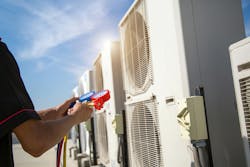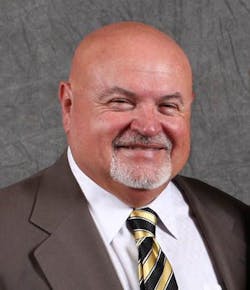Mastering Commercial Sales and Service for HVAC Mechanical Contractors
Commercial sales and service are crucial for HVAC mechanical contractors as they provide a steady revenue stream and long-term business growth. Unlike residential work, commercial projects involve larger-scale systems, ongoing maintenance contracts, and higher-value installations, offering greater profitability and repeat business. But how can mechanical contracting firms excel in commercial sales and service?
Contracting Business sat down with Woody Woodall, principal owner of Customer Focused Solutions, Inc. (CFS), a training and consulting firm dedicated on assisting service contractors on service best practices. Woodall is a retired pipefitter and 50-year industry veteran. After retirement, he founded CFS six years ago and works with MCAA and MSCA to help mechanical service contractors learn and grow their businesses.
CB: What are the most effective sales strategies for securing commercial contracts?
WW: There are several steps — a lot of people think that salespeople are just born. They’re natural to it, and all of that. That's just not the case. It’s like anything else — you have to hone your craft. You have to work at it.
The two biggest things, in my opinion, are the ability to reach out and develop relationships with people and be willing to do the hard work. Our biggest job as salespeople is helping people. Find out what their challenges are, find out what their needs are. And find a solution that will help them take something off their plate so they don’t have to worry about mechanical systems breaking down, having issues or downtime, and their people not being able to work because of a heating and air conditioning problem, or whatever it might be.
CB: How do you differentiate your company from competitors when bidding on projects?
WW: One of the things we emphasize in our training through MSCA is we have to develop a value proposition — something that's unique, something that your company does better than anyone else, and make sure that the customers are aware of that. A value proposition is a tremendous tool to have.
If you take that and add to the fact that you’re looking to build value at every turn and looking to help them overcome their challenges instead of trying to sell them something, then you’re going to be ahead of the game as a mechanical contractor. But it’s not an easy thing to do.
It's funny when you're working with people who are new to the industry, they don't always understand the fact that we need to build and share that value our company brings. It needs to be unique, and you need to look for ways to develop that value proposition into something spectacular.
CB: What common mistakes do contractors make when pitching commercial clients?
WW: There are a couple of things contractors need to shy away from. No 1, you never, ever downplay or talk bad about your competition. Ever. No. 2, many contractors don’t spend enough time focusing on their unique value proposition. Once it’s developed, they need a plan to get that message out there. This is what we’re offering, this is what we guarantee, this is what you can expect every single time when you’re dealing with XYZ company. Focus on what you can offer and stay away from the negative part of selling.
CB: What are the key factors in maintaining high-quality service for commercial clients?
WW: I'm a big proponent of developing a plan, and there’s a lot of different words for it, but I call it a ‘touch point analysis.’ It's important to look throughout all industries, the companies that develop that touch point analysis, they've seen every touch point they have with a customer from the time they call in for service to the time they collect their money after successfully taking care of them.
If we can identify all those touch points, identify exactly how we want our people to respond to those different touch points, how we want them to represent the company, then we can lay out processes and procedures. But we have to include the entire company — dispatch, back office, salespeople, management, and certainly all of the technicians. Once everybody knows what the game plan is, understands what their responsibilities are, and what happens if they don’t follow through, then we can have, not necessarily guarantee, but a quality experience for customers every single time.
I don't know how you do that without having some sort of plan and without having your entire team on board with that plan.
CB: What proactive measures can contractors take to prevent service disruptions for commercial clients?
WW: If we’re working with a client that has a maintenance contract, No. 1, when we’re working on-site, I like to emphasize for our service techs is to make sure you bring every little problem to the customer’s attention. You need to let them make the decision whether they want to repair or not, but you need to have an honest, frank conversation to let them know that this might not be a huge problem right now, but four months from now, it could be a worse problem. We need to make sure the customer understands the risk they take sometimes in not making repairs and mitigate as much as we can to make sure those possible disruptions to service won’t hurt the customer too much.
We also have to be ready to respond quickly. In today’s world, everybody wants it yesterday.
Because of that, when customers call, your entire operation should have alarms going off and people running to respond. If a customer needs help, you need to respond quickly, efficiently, and succinctly.
CB: What emerging trends are shaping the future of commercial sales and service?
WW: We just had our MSCA Educational Conference last year, and a big part of it was better understanding AI, how important it is and how we can utilize it. AI is going to be a game changer for a lot of us. It’s going to make us different than our competition. We have programs, and a lot of our vendors have built programs into their systems that automatically help our service technicians. For example, they can put down three to four words like “Replace belts on AC unit.” AI could then embellish that a little bit so our techs can spend more time diagnosing and troubleshooting issues and communicating with the clients. AI helps our techs by creating a succinct, clear message of the work performed and how they did it. It’s also helping our dispatchers as we move forward. AI can help dispatchers coordinate and identify who the neediest customer is and respond to them first.
AI is a huge piece of it, but a big part of what’s happening in our industry right now is the phaseout of some of these refrigerants. We’ve gone through this before as an industry. Because of that, we need to make sure our clients are educated about why we’re doing this and what impact it could have on them down the road. R-410 is going to be very expensive here shortly — it already is. R-22 is extremely expensive right now. So, if you’re a mechanical contractor and you haven’t reached out to your clients to share this information, they can’t make an educated decision. Down the road, when a piece of equipment dies or has a huge refrigerant leak, it’s going to cost them a tremendous amount of money. Our job is to educate them and let them know what’s happening in the industry.
CB: How do sustainability and energy efficiency factor into commercial sales and service strategies?
WW: Energy efficiency and saving money is a huge part of what we should be focusing on.
One of our biggest jobs is to save energy. If we are a savvy mechanical service provider and focused on the client, we're looking for ways to save them energy at every turn. We want to sort of flip that paradigm — instead of us costing the client money every year for our services, we're actually saving the client every year because we've implemented energy-saving processes and replaced old and outdated equipment.
CB: What advice would you give to contractors looking to break into or expand in the commercial market?
WW: First, focus on what your company does? Who are your company personnel? What do your service techs do? What do your salespeople do? Know what you do. Try and expand on that as much as possible.
At the same time, mechanical contractors have to pay attention to trends in the industry. Data centers are very on trend right now. In the Washington, D.C. area, most, if not all, mechanical contractors have at least one data center they’re building somewhere. And the companies who were pretty forward-thinking have focused probably 90% of their work on data centers — and not just building them, but servicing and maintaining them.
Next, never, ever, do a construction job without following up with some sort of maintenance contract for your service side. It's got to be a partnership. You have to introduce the service side of your business to your construction customers early in the process.
And last, but certainly not least, make sure that your people are cutting edge, and their education is top notch. Provide them with all of the classes that they need. Do in-house training, build your team morale through that. I know when I was a service technician, nothing made us more excited than the opportunity to get some factory training or additional training in some way. By doing that, you make your people in the field happy. They’re responsive, they’re focused, and they’re able to service the clients much better.
CB: What are the biggest lessons you've learned from your experience in commercial sales and service?
WW: The sales divisions are the lifeblood of your company. That’s what helps you grow. If you go into it with a positive attitude, looking to develop relationships, and really focus on helping people, not selling anything, you’re going to go a long way. I’m a big Zig Ziglar fan, and I know he’s an old-fashioned fellow, but I’m kind of old myself so I resemble that remark! One of the things he used to say is, “If you help other people get what they want, you’ll get everything you ever wanted.”
If we go in with the attitude, “I'm here to help people resolve their problems and be a resource moving forward,” you’re going to continue to build your business. No matter how many customers you have, you should always be looking for potential new clients. It's a tremendous industry to be in, and a lot of fun to meet new people and help them out. When you do that, you make friends that last a lifetime. I’ve got customers I developed early in my career that are still great friends. I just got an invitation to a friend’s first grandbaby’s christening. If you are just the guy trying to sell something, you’re not going to get that.
CB: Anything else you would like to add?
WW: I can't praise MSCA and MCAA enough. As far as I’m concerned, they have helped me grow as a professional. You're going to need some help somewhere down the line, and by developing relationships during these training sessions and interactions within these associations, you're going to be a luckier person, that's for sure.
For more information on MCAA and MSCA, visit www.mcaa.org and www.mcaa.org/msca.
About the Author

Nicole Krawcke
Nicole Krawcke is the Editor-in-Chief of Contracting Business magazine. With over 10 years of B2B media experience across HVAC, plumbing, and mechanical markets, she has expertise in content creation, digital strategies, and project management. Nicole has more than 15 years of writing and editing experience and holds a bachelor’s degree in Journalism from Michigan State University.

